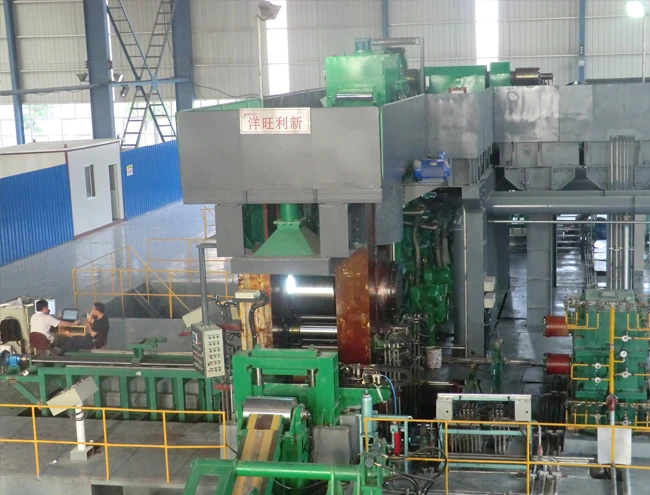
Roll Bonding Cladding: High-Strength, Corrosion Protection
Roll Bonding Cladding is a key solution in the manufacturing industry, specifically within Special Equipment Manufacturing Industry and Manufacturing of metallurgical specialized equipment. This article explores how Beijing Yang Wang Li Xin Sci&Tech Co.,Ltd. supports professionals with durable, high-performance products, and explains why this product is an ideal choice for businesses in these sectors.

Table of Contents
- Roll Bonding Cladding Overview
- Benefits & Use Cases of Roll Bonding Cladding in Manufacturing of metallurgical specialized equipment
- Cost, Maintenance & User Experience
- Sustainability & Market Trends in manufacturing
- Conclusion on Roll Bonding Cladding from Beijing Yang Wang Li Xin Sci&Tech Co.,Ltd.
Roll Bonding Cladding Overview
Roll Bonding Cladding is a solid-state metallurgical process that bonds dissimilar metals—typically a corrosion-resistant alloy to a carbon or low-alloy steel substrate—by applying heat and high pressure through a rolling mill. In hot roll bonding cladding, plate packs are surface-prepared, stacked, heated, and then passed through a high-reduction mill to achieve intimate contact and diffusion across the interface. The result is a single, integral plate that combines the mechanical strength of the base material with the corrosion or wear resistance of the clad layer.
For manufacturers in the Special Equipment Manufacturing Industry—especially those producing metallurgical specialized equipment, pressure vessels, and pipe plate for downstream clad pipe welding—this method delivers uniform clad thickness, high bond integrity, and excellent through-thickness properties. Typical production parameters include clad thickness ratios from 5–25%, plate widths up to multi-meter formats, and shear/bond strengths validated by ultrasonic testing (UT), shear tests, and bend tests to common industry standards (e.g., ASME and ASTM A263/A264/A265 for clad products). Beijing Yang Wang Li Xin Sci&Tech Co.,Ltd. designs and supplies dedicated cladding rolling mills with precision gauge control, robust reheating/soaking integration, and automated surface preparation lines to ensure repeatable quality at industrial scale. Explore the equipment details here: Cladding Rolling Mill.
Benefits & Use Cases of Roll Bonding Cladding in Manufacturing of metallurgical specialized equipment
In metallurgical specialized equipment, Roll Bonding Cladding enables reliable, cost-effective production of corrosion-resistant plate for reactors, heat exchangers, desulfurization units, desalination equipment, and storage tanks handling sour or chloride-rich environments. For linepipe producers, clad plate transformed into pipe and joined via clad pipe welding delivers superior service in offshore, refining, and hydrogen-ready infrastructure while minimizing reliance on expensive solid alloy stock. Hot roll bonding cladding also supports wear- and temperature-resistant overlays for coal chemical, mining, and steelmaking auxiliaries.
Key advantages include reduced alloy consumption versus solid CRA plate, tight thickness tolerances via hydraulic automatic gauge control (HAGC), improved plate flatness, and high interfacial bond strength verified by NDT. Beijing Yang Wang Li Xin Sci&Tech Co.,Ltd. integrates descaling, brushing, edge preparation, and controlled atmosphere heating options to raise first-pass yield and ensure clean interfaces before rolling. Their engineering team tailors mill geometry (two-/four-/six-high configurations), roll bending/crowning, and automation levels to match throughput, product mix, and compliance needs across the Special Equipment Manufacturing Industry.
Cost, Maintenance & User Experience
Total cost of ownership for Roll Bonding Cladding lines is driven by energy input, alloy utilization, yield, and uptime. By substituting solid alloy plate with clad structures, producers typically cut high-cost alloy consumption significantly, while maintaining corrosion performance—unlocking compelling ROI in plate and pipe markets. Automated plate handling, precise heating control, and high-reduction passes reduce rework and scrap, improving OEE and lowering cost-per-ton. When paired with real-time thickness/bond monitoring and recipe management, teams can standardize quality and shorten changeovers across different alloy pairings.
Maintenance considerations include roll surface integrity, furnace refractory life, drive system health, and NDT calibration. Users report smoother operations when predictive maintenance monitors bearing temperatures, mill vibrations, and roll wear, supported by readily available spares and remote diagnostics. Beijing Yang Wang Li Xin Sci&Tech Co.,Ltd. focuses on maintainability in mill design—access-friendly components, robust cooling/lubrication circuits, and modular controls—to help customers in the Special Equipment Manufacturing Industry achieve stable throughput and faster payback. Many producers target ROI within a few cycles of full-capacity utilization, depending on product mix and alloy spreads.
Sustainability & Market Trends in manufacturing
Sustainability priorities are reshaping metallurgical equipment choices. Roll Bonding Cladding aligns with resource efficiency by using thinner layers of critical alloys (e.g., Ni- and Mo-bearing grades) to achieve corrosion performance with a lower material and embodied-carbon footprint than solid alloy plate. Energy-optimized reheating, recuperative burners, and waste-heat recovery in hot roll bonding cladding furnaces can further reduce emissions per ton. Digital traceability and NDT data retention also help producers demonstrate compliance with evolving standards and customer specifications across energy, chemicals, desalination, and low-carbon projects.
Beijing Yang Wang Li Xin Sci&Tech Co.,Ltd. adopts an eco-conscious engineering approach—energy-efficient drive systems, automation for consistent yields, and options that support quality standards such as ASTM A263/A264/A265 for clad products. As markets expand for hydrogen, CCUS, and green ammonia, demand is rising for reliable clad plate suitable for downstream fabrication and clad pipe welding. By combining advanced mill controls with rigorous process integration, the company positions clients to meet regulatory expectations and win in sustainability-driven procurement.
Conclusion on Roll Bonding Cladding from Beijing Yang Wang Li Xin Sci&Tech Co.,Ltd.
Roll Bonding Cladding empowers manufacturers in the Special Equipment Manufacturing Industry to deliver high-strength, corrosion-resistant plate with lower alloy consumption and proven bond integrity—ideal for reactors, exchangers, and pipe plate destined for clad pipe welding. Beijing Yang Wang Li Xin Sci&Tech Co.,Ltd. combines process know-how with robust cladding rolling mills to help producers scale quality, reduce costs, and meet stringent standards. Ready to evaluate your next project? Contact us: email: Alley.wang@bjywlx.com — Visit our website: https://www.bjywlx.com
-
YWLX’s 1450mm Six-Hi Reversing Mill Goes Live in BangladeshNewsNov.24,2025
-
Adjusting Roll Gap in 6Hi Reversing Cold Rolling Mill for Thin StripNewsNov.13,2025
-
Quality Control Standards for Automatic Gauge Control in Strip RollingNewsNov.13,2025
-
Effect of Skin Pass Rolling on Metal DuctilityNewsNov.13,2025
-
Key Components of a Modern TempermillNewsNov.13,2025
-
Common Wear Patterns of Work Roll in Tandem Cold Mill OperationsNewsNov.13,2025
-
Revolutionary Skin Pass Rolling Technology for Enhanced Steel QualityNewsNov.04,2025










